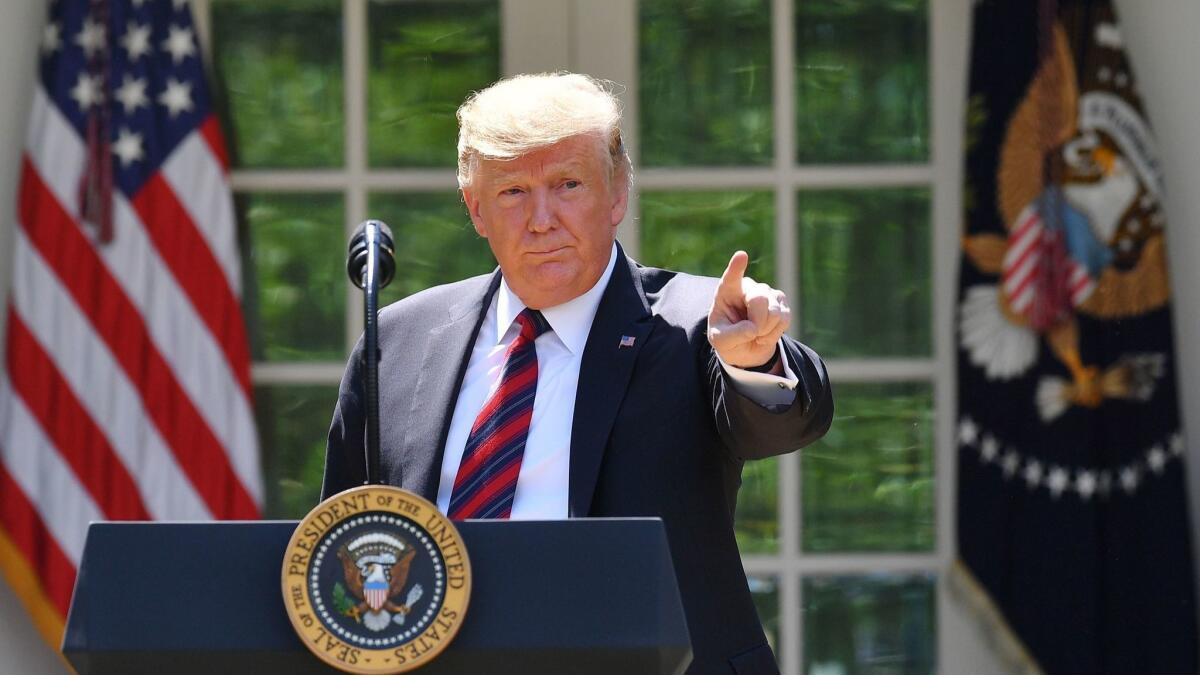Op-Ed: Trump’s immigration plan doesn’t have to be dead on arrival

Last week, Donald Trump finally did something conventional. Following the path of other recent presidents, he proposed a comprehensive overhaul of the U.S. immigration system that is doomed to fail.
Similar attempts were made — in better faith — by President George W. Bush and President Obama in 2006, 2007 and 2013. The attempts were all unsuccessful, as Trump’s will be. The 2013 bill, which garnered 68 votes in the Senate, was never even called for a vote in the Republican-controlled House.
Trump’s proposal calls for further reinforcement of the Mexican border and shifting immigration programs to favor the highly skilled and those with job offers rather than applicants with American family ties. It might gain the support of moderate Republicans, but it would be anathema to hard-liners and to Democrats.
Not so long ago, there was a near consensus that immigration systems in democratic destination countries would continue to liberalize. The Cold War was over, and once the Berlin Wall fell, all barriers were expected to follow. Immigration, it was thought, offered concentrated benefits to powerful voting blocs — business owners in search of both high-skilled and low-skilled labor, and ascendant immigrants seeking to reunite with family members. Any costs from immigration, it was thought, were diffusely spread among the native-born working classes, who might be made uncomfortable by foreigners but would not actually experience any attributable loss in income.
Attitudes toward immigration have become an expression of values.
Both presumptions were largely true, but observers underestimated the identity politics that emerged. As offshoring and mechanization of jobs deepened inequality and suppressed working class wages, it was easy to blame immigrants. This weakened the labor movement and undercut the status of white working class people in the societies they once defined.
Conservative U.S. politicians seized on cultural discomfort with growing numbers of foreigners — particularly from Latin America and Asia — and fanned anti-immigrant sentiment. The sense of social and economic displacement was only reinforced as more and more ethnic minorities entered the ranks of the American middle class, won key political victories and reoriented American social hierarchies.
Immigration eventually became a litmus test for partisanship, and today it is one of the greatest signals of political attitudes. Consequently, elected officials are far more uncompromising on the issue than in 2013, let alone 2006.
Democrats are demanding a humanitarian resolution to the status of undocumented immigrants, particularly young people, some of whom are currently protected from deportation under President Obama’s Deferred Action for Childhood Arrivals (DACA). Democrats also will not tolerate any reduction in the annual number of immigrants permitted to enter the United States and want to protect the refugee program and the prioritization of visa applicants sponsored by U.S. citizen family members.
Republicans are demanding greater border security and a more aggressive posture toward undocumented immigrants in the United States, regardless of whether they have been law-abiding contributors to their communities. For congressional Republicans, a bill that would grant citizenship to immigrants living in the country illegally would be a non-starter, and many GOP legislators are intent on cutting the annual number of immigrants who enter the United States legally.
In the current climate, one side’s goal is the other’s red line.
In other countries where parliamentary systems or dictators can streamline policymaking, a centrist path has been forged. Governments around the world have reoriented their immigration admissions to prioritize migrants needed for the labor pool, who are often placed on temporary visas without access to citizenship.
While increasing immigrant flows, this model has assuaged xenophobic publics, because the immigrants can only enter if they fill a labor gap, and their stays aren’t permanent. In Switzerland, the foreign-born now comprise 30% of the national population. Australia is at 29%. Even Japan, notoriously xenophobic, recently passed a new immigration law to relieve its aging demography.
With its redistribution of U.S. visas, the Trump administration proposal tries to do something similar. But such a bill is unlikely to fly with Republicans who want to see cuts in immigration admission or with Democrats, for whom family migration is untouchable. So why propose it?
President Trump has already locked in his support from the right. For those who believe that immigrants are a threat to American security, identity and culture, he is a messianic figure. His administration has aggressively and indiscriminately pursued the deportation of the undocumented, drastically cut the U.S. refugee program, restricted asylum, delayed naturalization and visa approval, banned immigrants from several Muslim-majority countries and allocated emergency funding for an extended border wall.
Enter the Fray: First takes on the news of the minute »
The current proposal is intended to reassure businesses and moderate voters that, despite these radical actions, the president understands the importance of immigration to the country’s economy and wants to modernize how applicants are selected. And when the initiative fails, he can argue that Democrats refused to update a flawed, uncompetitive system because of a commitment to “open borders.”
Rather than scoff at this cynical tactic, Democrats should seek a compromise that puts pressure on the administration. The provision of more labor visas is popular and bipartisan. Democrats could propose admissions criteria that ensure high-skilled-labor migrants also have U.S. family ties. This way, family and labor visas are not zero-sum.
The more likely scenario, however, is that we return to the familiar stalemate.
Attitudes toward immigration have become an expression of values. And as much as Americans lament the lack of compromise in Washington, we have rewarded politicians who tout their unwavering commitment to those values at the expense of small steps toward progress.
Justin Gest is an assistant professor of public policy at George Mason University and the author, most recently, of “Crossroads: Comparative Immigration Regimes in a World of Demographic Change” with Anna Boucher.
More to Read
A cure for the common opinion
Get thought-provoking perspectives with our weekly newsletter.
You may occasionally receive promotional content from the Los Angeles Times.






